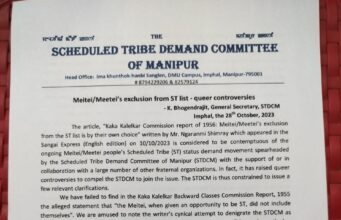Press Release – 17 September 2013, New Delhi/Guwahati
· What does freedom mean to the forest dweller in Manipur looking for money to bribe his way to a Transit Pass that will help him sell his home-grown bamboo?
· What does freedom mean to the small entrepreneur in Madhya Pradesh who faces more struggles in buying bamboo from Nagaland than from China?
· What does freedom mean to the Gram Sabha Pradhan in Orissa who still has to wade through a forest of procedures and regulations to exercise the rights guaranteed to his community by the Forest Rights Act?
These are the questions that we would like to highlight as we observe World Bamboo Day this year. Though India celebrated Independence 66 years ago and though most Indian industry got freedom in 1991 from the License-Permit-Quota-Raj, the small and marginalized individuals who rely on Bamboo for their livelihood, continue to bear the burden imposed on them by the Transit-Permit-Raj. We recommend that the government revisit and revise some of the laws and regulations currently restricting the Bamboo sector.
Bamboo—also known as Green Goldhas has 1,500 documented uses and occupies 12.8 percent of the total area under forests in India. It has enormous potential for employment generation, industrial use and environmental benefits as documented by the Planning Commission. For the 12th Plan, the sub-group working on NTFP (Non Timber Forest Produce, which includes Bamboo) and their sustainable management, estimated that 275 million poor rural people in India— about 23 percent of the total population—depend on NTFPs for at least part of their subsistence and cash livelihoods.
However, because it is governed by a complex web of forestry laws and policies, there are serious restrictions by most Indian states on the cultivation, harvesting and transportation of Bamboo in particular and NTFP in general. Consequently, the numerous industrial uses and environmental benefits of Bamboo lie unexplored apart from the huge employment potential that remains untapped.
A celebration of World Bamboo Day can be possible only when these laws are simplified, reformed significantly, and implemented fairly. CCS and the South Asia Bamboo Foundation ask that:
a. Property rights of forest dwellers be recognized through the effective implementation the Forest Rights Act. China’s experience has shown the benefits of private ownership in ensuring the sustainable development of bamboo
b. Transit pass requirements for Bamboo be removed in line with the circular from the Ministry of Environment and Forests to State Governments, issued in May 2013 (see http://jeevika.org/ministry-of-environment-and-forests-wants-states-to-free-bamboo-grown-on-private-land/ for details)
c. The many conflicting forestry laws governing bamboo be consolidated in order to make them simple and consistent. This includes the Indian Forest Act, Forest Conservation Act, Forest Rights Act, and the Panchayats (Extension to Rural Areas) Act. The consolidation of laws needs to go hand in hand with the consolidation of Ministries that manage these laws into one authority that will be empowered to study and reform the regulations as required and to support regulations with the right incentive and institutional structure to develop this sector.
Only then can World Bamboo Day have any productive meaning for tens of millions of Indians.
This release has been issued by the Centre for Civil Society (New Delhi), a public policy research and advocacy think tank working in the areas of livelihoods and education and the South Asia Bamboo Foundation, which works on Bamboo development.
For further information contact:Samta Arora; [email protected] | +91 99538 27773











